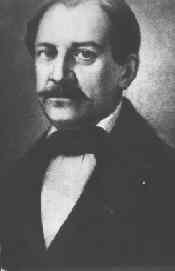Your search - Negruzzi, Constantin - did not match any resources.
Constantin Negruzzi
 Constantin Negruzzi (; also known as Costache ; 1808 – 1868) was a Romanian poet, novelist, translator, playwright, and politician.
Constantin Negruzzi (; also known as Costache ; 1808 – 1868) was a Romanian poet, novelist, translator, playwright, and politician.Born in Trifeștii Vechi, Moldavia, he was educated at home by a Greek tutor. In a later article, he admitted that he had taught himself the Romanian language from a book written by Petru Maior. During the 1821 Revolution, his family took refuge in Chișinău, Bessarabia, where he met Alexander Pushkin and developed an interest in literature.
Notable among his writings are his memoirs, ''Amintiri din junețe'' ("Memories of Youth"), and his historical works ''Fragmente istorice'' ("Historical Fragments"), ''Negru în alb'' ("Black in White"), and ''Aprodul Purice'' (''aprod'' was a minor noble title, usually referring to the son of a lord; ''Purice'' is a proper name but literally means "flea"; see Movilești). He also translated several of Victor Hugo’s ballads, some of Thomas Moore’s poetry, and works by Antiochus Kantemir. Negruzzi wrote two plays, ''Muza de la Burdujeni'' ("The Muse of Burdujeni") and ''Cârlani'' ("Lambs"), and translated a number of other dramatic works. In 1841, Negruzzi, together with Mihail Kogălniceanu, printed the first cookbook in the Romanian language: ''200 Proven Recipes for Dishes, Pastries, and Other Household Works''.
Negruzzi also held several public offices, including that of finance minister and deputy under Prince Mihail Sturdza. A supporter of liberalism and reform, he was twice exiled to his estate in Trifești for his criticism of the government. His son, Iacob Negruzzi, also became a noted writer. Provided by Wikipedia
